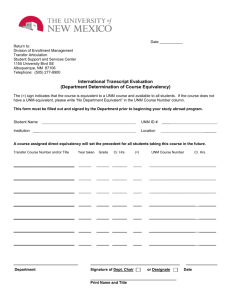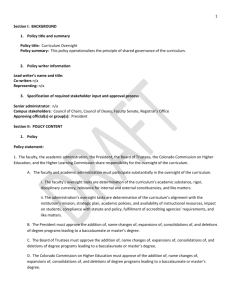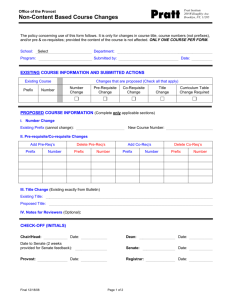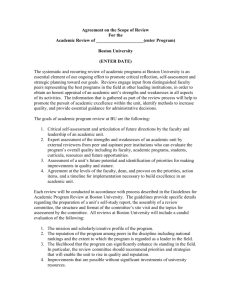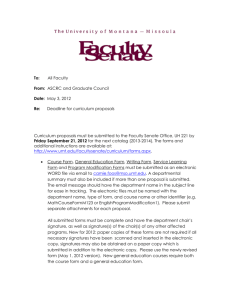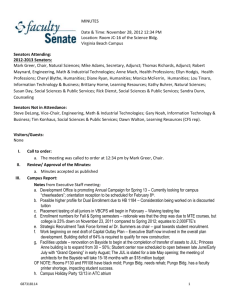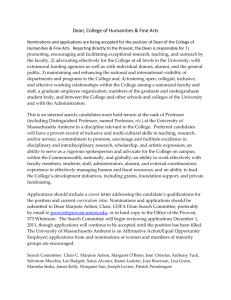FACULTY SENATE SUMMARIZED MINUTES, 8-26
advertisement
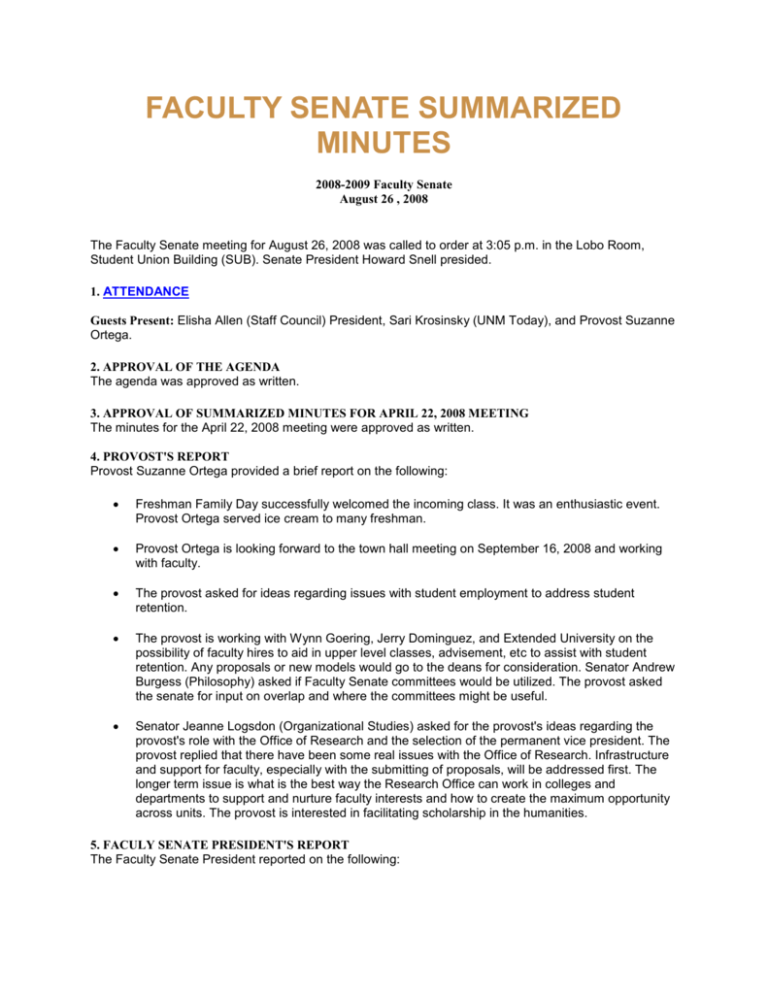
FACULTY SENATE SUMMARIZED MINUTES 2008-2009 Faculty Senate August 26 , 2008 The Faculty Senate meeting for August 26, 2008 was called to order at 3:05 p.m. in the Lobo Room, Student Union Building (SUB). Senate President Howard Snell presided. 1. ATTENDANCE Guests Present: Elisha Allen (Staff Council) President, Sari Krosinsky (UNM Today), and Provost Suzanne Ortega. 2. APPROVAL OF THE AGENDA The agenda was approved as written. 3. APPROVAL OF SUMMARIZED MINUTES FOR APRIL 22, 2008 MEETING The minutes for the April 22, 2008 meeting were approved as written. 4. PROVOST'S REPORT Provost Suzanne Ortega provided a brief report on the following: Freshman Family Day successfully welcomed the incoming class. It was an enthusiastic event. Provost Ortega served ice cream to many freshman. Provost Ortega is looking forward to the town hall meeting on September 16, 2008 and working with faculty. The provost asked for ideas regarding issues with student employment to address student retention. The provost is working with Wynn Goering, Jerry Dominguez, and Extended University on the possibility of faculty hires to aid in upper level classes, advisement, etc to assist with student retention. Any proposals or new models would go to the deans for consideration. Senator Andrew Burgess (Philosophy) asked if Faculty Senate committees would be utilized. The provost asked the senate for input on overlap and where the committees might be useful. Senator Jeanne Logsdon (Organizational Studies) asked for the provost's ideas regarding the provost's role with the Office of Research and the selection of the permanent vice president. The provost replied that there have been some real issues with the Office of Research. Infrastructure and support for faculty, especially with the submitting of proposals, will be addressed first. The longer term issue is what is the best way the Research Office can work in colleges and departments to support and nurture faculty interests and how to create the maximum opportunity across units. The provost is interested in facilitating scholarship in the humanities. 5. FACULY SENATE PRESIDENT'S REPORT The Faculty Senate President reported on the following: President Howard Snell introduced himself. He has been with UNM since 1986 and has been a faculty senator since 2004. President Snell hopes to maintain the momentum from the past couple of years, especially last year. He is not a senator as he has reached the term limit. President Snell introduced the Operations Committee. The 2008-2009 Operations Committee is Past-President Jackie Hood (Organizational Studies), President-Elect Doug Fields (Physics), Nick Flor (Marketing, Information, and Decision Sciences), Nikki Katalanos (Family and Community Medicine), Mary Lipscomb (Pathology), and Pamela Pyle (Music). The Operations Committee acts as the steering committee for the senate. President Snell requests that when senators are recognized to speak that they introduce themselves. The introduction is for both the summarized minutes and to become familiar to their fellow senators. President Snell reported that there was three things that the Operations Committee has been working on over the summer. There were three resolutions passed by the Operations Committee: the first resolution was that Faculty Contracts should remain in the Office of the Provost and not be moved to Human Resources; the second resolution dealt with asking President Schmidly to take a resolution to the Council of University Presidents to institute a statewide long-term faculty compensation plan for the faculty of the colleges and universities of New Mexico and a separate plan for parity with peer institutions; the third resolution was a request to the Board of Regents to accept the findings regarding the personal information of UNM faculty and staff.. There is some concern with the Princeton Review that revealed that UNM students feel the faculty are not accessible and not as high quality as other institutions. The Provost, University Communication and Marketing, and President Snell have all spoken with the Princeton Review. President Snell explained that the Princeton Review is not a rigorous study and the survey data is not available. The Princeton Review is conducted every three years so there is a possibility that UNM will appear in the same position in the report that is released next year. Wynn Goering and Mark Chisholm have data to the contrary that UNM faculty is quite accessible. Wynn Goering will come to the senate and present the data UNM has. The Operations Committee and the Provost's Office will work with the student groups the Associated Students of UNM (ASUNM) and the Graduate and Professional Student Association (GPSA) to work on a student survey to get a true picture of the issue. CONSENT AGENDA 6. APPROVAL OF THE SUMMER 2008 DEGREE CANDIDATES Approval of the Summer 2008 Degree Candidates passed by unanimous voice vote of the Faculty Senate with one abstention. AGENDA TOPICS 7. INDIVIDUAL DEVELOPMENT AND EDUCATIONAL ASSESSMENT (IDEA) Operation Committee member Nick Flor presented Power Point on IDEA below. The Faculty Handbook specifies that faculty are to be evaluated by their students. For the past 30 years Instructor Course Evaluation System (ICES) was used. The ICES mainframe was retired last year. IDEA is the replacement. Background Faculty handbook requires the university to provide instructors a student evaluation of teaching (SET) instrument = ICES state. However, ITS is decommissioning the mainframe that runs ICES this Spring 2008. ICES developers have no plans for an updated version. Teaching Enhancement Committee recommended FACE as the survey instrument to pilot. FACE pilot was unsuccessful-too many bugs IDEA was one of the finalists chosen by the Teaching Enhancement Subcommittee. Small pilot (18 participants) Fall 2007. IDEA started Summer 2008. IDEA vs. ICES IDEA (ca. 1968, revised 1997) ICES (ca. 1970s) Used by over 200 universities Used by UNM, UIUC and others Formative feedback Summative feedback Use one of 2 forms: One form: Short form 18 items 20 custom items Long form 47 items 19 custom items Adjusts for extraneous influences: Standard items. Databank of 1000+ custom questions Does not adjust for extraneous influence Student motivation to take the class regardless of who taught it. Student work habits. Class size. Student effort not attributable to the instructor. Course difficulty not attributable to the instructor. Compares scores with discipline & across university (others possible) Compares scores across university Frequently Asked Questions When will IDEA replace ICES? Starting Summer of 2008 Is there an online version of IDEA? Yes, but response rates for online surveys are generally too low to produce statistically valid reports. Thus, there are no plans in the near future to use the online version of IDEA. Moreover, IDEA does not provide any costs savings for using their online surveys. Can I add my own survey items? Yes, you will have to write them on a separate piece of paper and give this to the students. IDEA will report means and standard deviations for your questions. Faculty handbook requires the university to provide instructors a student evaluation of teaching (SET) instrument = ICESe state. Is IDEA a valid and reliable instrument? Yes. See: IDEA Technical Reports http://idea.ksu.edu/resources/techreports.html Which form should I use? If your goal is to improve teaching, use the diagnostic form If you have other resources to help improve your teaching and you intend to use IDEA for administrative purposes only, use the short form Certain class types, e.g., labs & discussion sections, may be best served with the short form I’m sure I can write a better survey than IDEA. Do I have to use IDEA? Technically, no. The faculty handbook requires that instructors provide student evaluations of teaching for tenure and promotion purposes (FH1.2.1c, 4.5.1b, 4.9.3) and does not specify a particular instrument . Practically, yes. Performance appraisal and evaluation should be tied to a reliable instrument. Schools should use a consistent instrument. I’m part of a team-taught course. Will IDEA work? Yes, see IDEA reading: http://idea.ksu.edu/StudentRatings/TeamTaughtClasses.pdf I’m a department chair, how do I use IDEA to evaluate my faculty members? That is up to you. OSET can provide guidance on how to use IDEA as part of a portfolio for assessing teaching effectiveness. See IDEA reading: http://idea.ksu.edu/StudentRatings/AdministrativeDecision.pdf I heard that instructors can “game” the IDEA system by choosing only those objectives that they do well on (True or False)? True. However, as a dept. chair you can ask your faculty member to justify their course objectives and track those objectives over time. What do department administrators have to do to administer ICES? The process is substantially the same. They will have to ask faculty whether to use the short or diagnostic form. 8. SUMMARY OF RETREAT President Snell reported that the Faculty Senate Retreat was successful. There was a false fire alarm and the group did not fully return. There were presentations from President Schmidly and Provost Ortega. There was a discussion on the committee structure and agility. President-Elect Doug Fields commented that he has received a lot of feedback from the retreat and via email. A committee structure that facilitates use of the committees is needed. This may include less committees having broader responsibilities. There is much work to do to make the committees more flexible and productive. President-Elect Fields asked the senators for feedback. He will be meeting with all of the committee chairs. He would like to understand what are the issues and what are the problems the committees face and how to address those. He intends to work closely with the committees. President-Elect Fields would also like to meet with the Provost regarding the committees, funding, and utilizing them. A senator from the retreat had commented that the reason many senators do not attend the meetings is due to the fact that the meetings are 'boring.' President Snell stated that the issue of boring meetings will be addressed early this semester. 9. DISCUSSION OF PRESIDENT SCHMIDLY'S JUNE 11TH RESPONSE TO RESOLUTION President Snell reported that University President Schmidly submitted a response on June 11 to one of the resolutions passed by the general faculty at the April 30 Special Faculty Meeting. President Schmidly will be releasing the response to the second resolution by August 31. President Schmidly has also called a faculty town hall meeting to discuss the reports on Tuesday, September 16 from 4:00-6:00 p.m. in Woodward 101. President Snell stated that it is within the purview of the faculty to call another general faculty meeting if they feel that the responses are not acceptable or if the responses need to be replied to. The first general faculty meeting was called in April 2008 via a petition requiring signatures from at least five percent of the voting faculty. The Committee on Governance can also call a general faculty meeting as well and will not need a petition drive. The consensus of the senate was to wait until President Schmidly releases his report and holds the town hall meeting before responding. 10. PRIORITIES FOR THE FALL 2008 SEMESTER (AND THE ACADEMIC YEAR) The possibility of two meetings per month for the Spring 2009 semester will be revisited and voted upon at the November meeting. There is a listserve to discuss faculty business. The address is facsen-l@unm.edu. All senators are on the list. President Snell proposed that a couple of administrators would be invited to each senate meeting to discuss particular issues and to answer some provided questions in their areas. Examples of the relevant vice presidents and the issues for them to speak on are: Vice President Mark Nigliazzo (Rio Rancho Operations and Branch Campus Academic Affairs): discuss the Rio Rancho campus. Vice President Carmen Alvarez Brown (Enrollment Management): to discuss the breaking out of the enrollment band and state funding. Interim Vice President Julia Fulghum (Office of Research and Economic Development): to discuss the Research Office. Vice President Helen Gonzales (Human Resources): to discuss the move to self-funded Insurance. President John Stropp (UNM Foundation): discuss the UNM Foundation structure and the development of University Foundation owned properties. Provost Suzanne Ortega: Faculty Retention Plan President David Schmidly: Compensation. 11. NEW BUSINESS AND OPEN DISCUSSION The September 23, 2008 Faculty Senate meeting will be held in the Scholes Hall Roberts Room 12. ADJOURNMENT The meeting was adjourned at 4:45 p.m. Respectfully submitted, Rick Holmes Office of the Secretary
